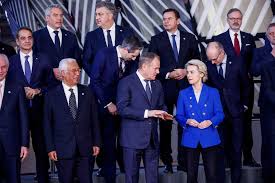
Introduction: Poland at a Political Crossroads
Poland’s new president, Karol Nawrocki, has taken office during a transformative moment for the country Poland new president. Elected in 2025 with a narrow 50.89% majority, Nawrocki—a conservative historian backed by the right-wing Law and Justice (PiS) party—faces a daunting task: preserving traditional values while aligning with the democratic and integrationist ethos of the European Union (EU). With Poland also assuming the rotating EU presidency from January to June 2025, the stakes have never been higher.
Nawrocki’s Conservative Roots and Nationalist Leanings
Before becoming president, Nawrocki was best known as the director of the Institute of National Remembrance, where he promoted a historical narrative focused on Polish patriotism and resistance. His campaign promised to “defend Polish values,” oppose “Brussels overreach,” and bring power “closer to the people.” These messages resonated with Poland’s rural voters and conservative base, who felt alienated by urban liberalism and EU bureaucracy.
However, Nawrocki’s election also raised red flags in Brussels. His alignment with right-wing figures like Viktor Orbán of Hungary and Donald Trump—who publicly endorsed Nawrocki—signals a possible confrontational stance towards EU institutions.
EU Concerns: Rule of Law, Judiciary, and Human Rights
The European Union has long criticized Poland’s judicial reforms under the PiS, claiming they undermine the independence of courts. While outgoing centrist Prime Minister Donald Tusk has promised to restore rule-of-law standards and rebuild ties with the EU, Nawrocki could veto or delay such reforms.
Already, tensions are brewing. The European Commission recently warned Poland that continued rule-of-law violations could lead to a freeze in billions of euros in EU funds. Nawrocki’s policy positions—such as his resistance to LGBTQ+ rights legislation and media independence—may exacerbate these issues.
Poland’s EU Presidency: Responsibility Amid Division
As president of the Council of the EU, Poland is responsible for driving consensus among the 27 EU member states. Nawrocki must balance domestic conservative agendas with EU-level leadership. While his foreign policy advisors stress NATO cooperation and opposition to Russian aggression, his domestic focus may hinder broader EU goals like digital integration, climate neutrality, and migration reform.
Internal Political Gridlock
Nawrocki’s presidency also brings tension with Poland’s bicameral legislature. Prime Minister Tusk’s coalition controls parliament but lacks the three-fifths majority needed to override presidential vetoes. If Nawrocki opposes legislation related to judiciary independence, climate goals, or social reform, legislative deadlock could ensue.
This internal friction mirrors similar patterns seen in countries like Italy and Hungary, where populist presidents and centrist parliaments have clashed. Nawrocki’s ability—or inability—to work with the legislative branch could determine the effectiveness of Poland’s EU presidency and the nation’s long-term stability.
Public Sentiment and Civil Society Reactions
Civil society groups, particularly in urban centers like Warsaw and Gdańsk, have expressed concern about a democratic backslide. Protests erupted following Nawrocki’s initial veto of a media transparency bill. Meanwhile, conservative media outlets praise him as “a guardian of Polish sovereignty.” The polarized public reaction adds complexity to Nawrocki’s governance strategy.
Conclusion: The Balancing Act Begins
Karol Nawrocki’s presidency represents both opportunity and risk. If he can reconcile his conservative values with EU principles, Poland could strengthen its role as a major European power. However, persistent internal conflict and rising Euroscepticism may isolate the country at a time when unity is most needed. For now, the world watches closely as Nawrocki attempts to balance tradition with transformation on both the national and European stage.


